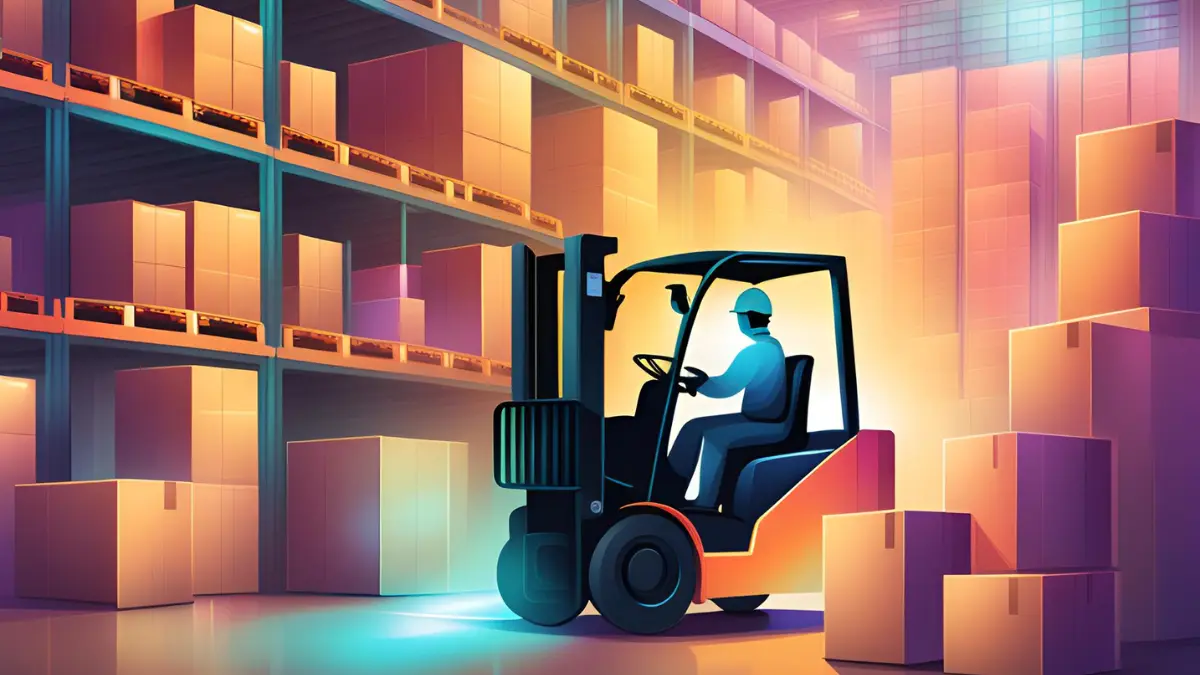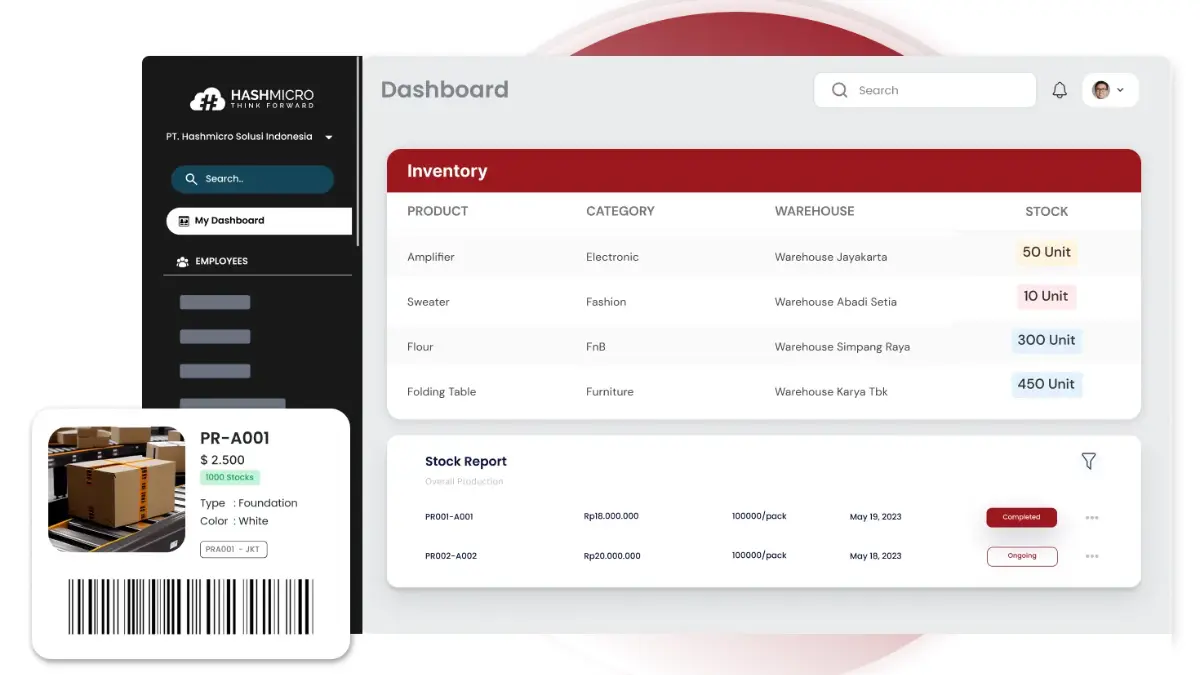Efficiently managing the storage and movement of imported goods is crucial for businesses, yet many managers struggle to balance regulatory requirements with operational efficiency. A bonded warehouse might seem the answer, but it can also introduce new hurdles.
From navigating strict customs regulations to managing high-value inventories, managers face numerous challenges in bonded warehousing. Failing to address these can lead to compliance issues and increased operational costs.
According to the International Enterprise Singapore report, improper handling in bonded warehouses can result in significant financial penalties. This highlights the critical need for compliance and effective management to avoid costly disruptions.
As we explore bonded warehousing, this article will also introduce software tools that can help optimize these operations. Read on to discover how your business can benefit from these solutions.
Table of Content:
Table of Content

Key Takeaways
|
What is Bonded Warehouse?
Bonded warehouses are privately or government-owned facilities where imported goods are stored without paying duties. These warehouses allow businesses to defer taxes until the goods are sold or removed, improving cash flow.
They offer a strategic solution for industries dealing with dutiable items, from alcohol to luxury goods. Businesses can also manipulate or process goods under customs supervision, adding value while delaying duty payments.
For international trade, bonded warehouses help companies avoid paying duties if the goods are exported directly. With the right warehouse management software, businesses can easily manage inventory, ensuring compliance and operational efficiency.
How does a Bonded Warehouse Work?
Understanding how a bonded warehouse operates is crucial for businesses importing goods. These specialized facilities offer a significant advantage by allowing companies to store products without immediately paying customs duties.
Before diving into the specifics, let’s explore the fundamental processes that make bonded warehouses essential to global trade logistics.
- Apply for and acquire the bond: To start operating a bonded warehouse, you must submit a detailed application to the local Customs and Border Protection (CBP) port director. The application must include the warehouse’s location, intended use, access type, and a thorough description of the goods to be stored, ensuring compliance with liability and fire safety regulations.
- Import goods: Once the bond is approved, you can begin importing goods to your bonded area. Depending on the logistics, it may take a few days or months for merchandise to arrive and be ready for storage.
- Store and control goods: After arriving, they are stored and managed according to type, ensuring proper organization within the customs warehouse. If needed, some goods may undergo processing under the supervision of customs authorities before distribution.
- Fulfill and ship orders: If your bonded warehouse also serves as a fulfillment center, your team will pick, pack, and ship orders to customers or the next distribution point. This ensures smooth order management while the goods are still under customs control until all conditions are met.
- Pay import duties and taxes: The applicable duties and taxes must be paid before shipping goods from the bonded warehouse. Depending on the specific agreement and warehouse type, the responsibility for these payments typically falls on the warehouse operator or the importer.
Experience how bonded warehouse management can streamline your global trade logistics with HashMicro’s advanced system. Try our free demo today to see how our tailored solutions can enhance efficiency, reduce costs, and simplify your warehouse operations.
Hashy AI Fact

Need to Know
Hashy AI WMS is the ideal choice for smart warehouse management. With AI-powered automation and real-time tracking, it boosts efficiency and accuracy in every operation.
Request a free demo today!
Benefits of a Customs Bonded Warehouse
A customs-bonded warehouse offers businesses significant advantages in managing imported goods under customs control. By delaying duty payments, companies can optimize cash flow and store goods securely until needed.
This solution enhances operational efficiency and provides flexibility in inventory management, making it a valuable asset for businesses that engage in international trade.
1. Simplified international shipping
Bonded warehousing streamlines international shipping by offering businesses a place to store imported goods without immediately paying taxes and duties. Goods can be easily moved across borders while remaining under customs control, simplifying logistics.
Additionally, businesses in Singapore can consolidate shipments and delay payments, improving cash flow. This system helps companies to navigate the complexities of international shipping with greater ease and flexibility.
2. Extended storage solutions
A bonded warehouse in Singapore offers a secure solution for businesses needing long-term storage without the burden of upfront duties and taxes. Companies can store goods for extended periods, allowing them to plan distribution or export at the most opportune times.
This flexibility means goods can be stored until favorable market conditions or customer demand increases. It’s a perfect solution for businesses that require strategic timing in their logistics operations.
3. 24/7 access to stored goods
With 24/7 access, bonded warehouses ensure businesses can retrieve their goods whenever needed, offering unparalleled convenience. This flexibility supports businesses with unpredictable schedules or urgent orders that must be fulfilled at odd hours.
Additionally, warehouse management system in Singapore enhances this accessibility by providing real-time tracking and inventory control. This constant availability ensures operations run smoothly and efficiently.
4. Cost-saving opportunities
One of the most significant advantages of a customs warehouse is the ability to defer payment of import duties and taxes, which can significantly improve cash flow. Businesses can store goods without incurring these costs until the products are ready for sale or export.
This allows companies to use their financial resources more strategically, such as investing in other business areas. It’s an intelligent way to manage capital while keeping goods readily available. For optimal inventory management, businesses can consider using a WMS Singapore solution, ensuring goods are well-organized and accessible.
5. Enhanced payment flexibility
Bonded warehousing offers more control over when payments are made, allowing businesses to manage their finances more effectively. Since duties and taxes aren’t due until goods leave the warehouse, companies can strategically plan when to release products to minimize financial strain.
This system also allows businesses to spread out large payments over time rather than facing a massive tax bill simultaneously. It’s a flexible solution for managing expenses in a competitive business environment.
6. Seamless in-house fulfillment
With in-house fulfillment services, businesses using a bonded warehouse in Singapore can streamline operations by managing storage, packaging, and shipping in one place. This integration reduces costs associated with outsourcing fulfillment services.
It also gives businesses greater control over the quality and speed of their order processing. Ultimately, it enhances efficiency, providing a seamless customer experience while keeping operations under direct supervision.
7. Adaptable handling of restricted goods
Bonded warehouses provide the necessary infrastructure to securely manage restricted or specialized goods for businesses that deal with them. Goods that require specific handling or storage conditions can be maintained under customs control without triggering immediate duties.
This is particularly useful for goods that must be exported again, avoiding unnecessary taxes. The ability to handle such products under strict regulations adds a level of compliance critical for many industries.
8. Improved security measures
Security is a top priority in bonded warehouses, protecting goods from theft, damage, or loss. These warehouses have advanced security systems, including surveillance, alarms, and restricted access, giving businesses peace of mind.
Additionally, the goods are monitored by customs authorities, adding an extra layer of oversight. This enhanced security makes bonded warehousing an attractive option for businesses with valuable or sensitive inventory.
After knowing some of these benefits, you will want to know whether the HashMicro warehouse software solution fits your company’s budget. For that, click the banner below to find out more about HashMicro’s price calculation scheme.
The Difference between Bonded vs. Non-bonded Warehouses
The most significant difference between regular and bonded warehouses in Singapore lies in customs regulations. In a standard warehouse, goods are immediately subject to full duties and taxes, offering more flexibility for general storage needs.
On the other hand, bonded warehousing allows businesses to defer these payments until the goods leave the facility, providing a cash flow advantage, especially for import-heavy businesses.
Moreover, bonded warehouses offer enhanced security due to strict customs oversight, making them ideal for storing imported goods under supervision.
While regular warehouses provide essential services like packing and shipping, bonded warehouses can offer value-added services such as labeling and order fulfillment, giving companies extra benefits in managing their inventory.
The Main Purposes of a Bonded Warehouse in Singapore
A bonded warehouse plays a crucial role in Singapore’s thriving import-export industry. It offers businesses a way to store goods without immediately paying duties. This allows companies to manage cash flow better, particularly when goods are being stored for re-export or future sales.
Bonded warehouses can also benefit businesses by enhancing security and complying with customs regulations. In the following section, we will explore the primary purposes of a bonded warehouse and how it supports various business needs.
- Deferred payment of duties and taxes: One key advantage of bonded warehousing is the ability to defer import duties and taxes until the goods are removed for local use. This allows businesses in Singapore to manage their cash flow more effectively, freeing up resources for other investments while their goods remain in a customs warehouse.
- Temporary storage: Bonded warehouses offer temporary storage for goods awaiting customs clearance or further distribution, reducing congestion at ports and entry points. This helps businesses in Singapore ensure their goods are securely stored and easily accessible without rushing through customs.
- Allowing re-export: For businesses involved in international trade, bonded warehouses enable goods to be stored without paying local duties as long as the items are intended for re-export. This process saves costs and simplifies logistics, allowing businesses to operate efficiently within the bonded area.
- Repackaging and labeling: Goods in a bonded warehouse can be repackaged and labelled to meet local market standards before distribution. This flexibility allows businesses to adjust their products while deferring tax liabilities and asset payments, ensuring compliance with local regulations and market preferences.
- Quality control: Bonded warehouses in Singapore provide a controlled environment where goods are carefully monitored to ensure quality. With advanced technology like climate control systems and detailed tracking via barcode tracking software and warehouse management software, businesses can ensure their products remain in top condition before distribution.
- Enhanced storage and security: Offering long-term storage, bonded warehouses ensure that goods are safely secured until they are needed. With state-of-the-art security measures like surveillance and access control, these warehouses provide a reliable solution for protecting valuable goods without immediate tax obligations.
What are the Two Types of Bonded Warehouses?
In Singapore, two main types of bonded warehouses are designed to meet different business needs: Licensed Warehouses (LW) and Zero-GST Warehouses (ZGS). Licensed Warehouses are tailored to store dutiable goods like liquor, tobacco, and motor vehicles, offering the benefit of suspended duty and GST until the goods are sold or re-exported.
These warehouses have strict customs regulations and are divided into three subtypes, each with varying security levels based on the value and type of goods stored.
On the other hand, zero-GST warehouses are used for non-dutiable goods such as electronics, clothing, and machinery. The critical advantage of ZGS warehouses is the ability to suspend GST until the goods leave the warehouse, making them ideal for businesses focusing on re-export or value-added services.
These warehouses also have subtypes that cater to bulk storage and services like packing and labeling, offering flexibility to streamline operations.
Choosing between the two depends on the nature of your goods and business objectives. For example, a zero-GST warehouse could be the most efficient solution if you focus on non-dutiable items and need storage with flexible re-export options.
What are the Examples of Bonded Warehouses in Singapore?
When exploring bonded warehouses in Singapore, businesses can access various options tailored to multiple industries. Specialized facilities cater to your needs, ensuring smooth operations and compliance with customs regulations, whether dealing with dry goods, liquids, or even temperature-sensitive products.
- Dry Bonded Warehouses: PSA Lion Terminal, located in Pasir Panjang Terminal FTZ, offers containerized cargo handling and value-added services. Similarly, CWT Warehouse near Changi Airport provides bonded storage for general cargo with efficient access to air freight networks. Yusen Logistics and DHL Global Forwarding offer flexible storage options and customized solutions across multiple bonded warehouses in Singapore.
- Wet Bonded Warehouses: Vopak Singapore Terminal on Jurong Island is one of Asia’s largest storage terminals for bulk liquid chemicals and petroleum. Universal Terminal, also on Jurong Island, specializes in storing liquefied natural gas (LNG) and other bulk gases, providing critical storage for industries needing secure and compliant solutions.
- FTZ Bonded Warehouses: Changi Airfreight Centre, located within Changi Airport FTZ, is dedicated to air cargo handling and offers bonded warehousing space for various goods. Jurong Port Logistics Centre provides multi-modal cargo handling within the Jurong Island FTZ, ensuring businesses benefit from optimal warehouse management and logistics services.
These examples show that selecting the right bonded warehouse in Singapore depends on the nature of your goods and logistical needs. Each warehouse offers different advantages, from proximity to key ports and airports to industry-specific storage solutions.
Transform Your Bonded Warehouse with HashMicro’s WMS Solution for Unmatched Efficiency
HashMicro’s Warehouse Management System (WMS) is one of the leading software solutions in Singapore. It is designed to streamline operations in bonded warehouses. It addresses common challenges such as inventory mismanagement, compliance issues, and manual processes, ensuring your warehouse operates more efficiently.
If you’re looking to explore the solutions HashMicro offers, take advantage of the free demo and consult with their professional team today!
HashMicro’s WMS solution includes several key features to boost the efficiency of your bonded warehouse, such as:
- RFID warehouse rack stock automation: Implement RFID technology to quickly scan and monitor inventory within warehouse racks to automate stock tracking.
- Barcode, lot, and serial number tracking: Accurately track inventory using barcode, lot, and serial numbers, ensuring precise stock management.
- Stock optimizer per warehouse: Maximize storage efficiency by optimizing stock placement within each warehouse. This feature ensures inventory is organized for quick access, minimizing space wastage and improving operational flow.
- Removal strategy management: Implement an intelligent removal strategy for stock, such as FIFO or LIFO, to ensure efficient turnover.
- Pick, pack, delivery 3-step route warehousing: Streamline the warehouse workflow by automating the pick, pack, and delivery processes.
- Stock in and out tracking: Monitor all stock movements in real-time, ensuring accurate updates on inventory levels.
- Stock aging analysis: Identify slow-moving items through stock aging analysis to prevent excess inventory.
- Multi-warehouse and location management: Centralize stock data and operations to manage multiple warehouses and locations quickly.
In addition to these features, HashMicro excels in integrating with other systems and modules, supporting full automation for your bonded warehouse. The platform also offers flexibility, allowing for feature customization to match the complexity of your warehouse management needs.
Conclusion
A bonded warehouse is a secure facility where imported goods are stored under customs control until duties are paid or the items are re-exported. It offers businesses flexibility in managing inventory and reduces financial strain by deferring customs duties while ensuring regulatory compliance.
HashMicro’s Warehouse Management System (WMS) is the ideal solution for bonded warehouses looking to streamline operations. With features like real-time inventory tracking, automated order processing, and integration with other systems, HashMicro helps improve accuracy, reduce errors, and optimize overall warehouse efficiency.
If you’re ready to take your bonded warehouse operations to the next level, explore the benefits of HashMicro’s WMS by trying their free demo and consultation with their expert team today!

FAQ About Bonded Warehouse
-
What does it mean when a warehouse is bonded?
A bonded warehouse, or bond, is a building or other secured area in which imported but dutiable goods may be stored, manipulated, or undergo manufacturing operations without payment of duty. They may then be again exported without payment of duty. It may be managed by the state or by private enterprise.
-
What is the difference between a warehouse and a bonded warehouse?
Goods stored in bonded warehouses are not subject to customs duties, excise taxes, etc. because the import process has not been completed, and you do not need to pay customs duties until the goods are released from the warehouse.
-
Which type of goods are stored in a bonded warehouse?
The goods stored in customs bonded warehouses are imported goods that require the importer to pay a duty. However, the goods can be stored in the customs bonded warehouse for up to five years without duty, taxes, or other fees. Either a government or private enterprise can run custom bonded warehouses.
-
What are the benefits of using a bonded warehouse?
Most bonded warehouses are located near major ports. This allows companies to store goods at the port of entry until they are ready to be distributed. Utilising these bonded warehouses can create savings across the entire supply chain by reducing lead time, transport cost, and potential damage.


























































